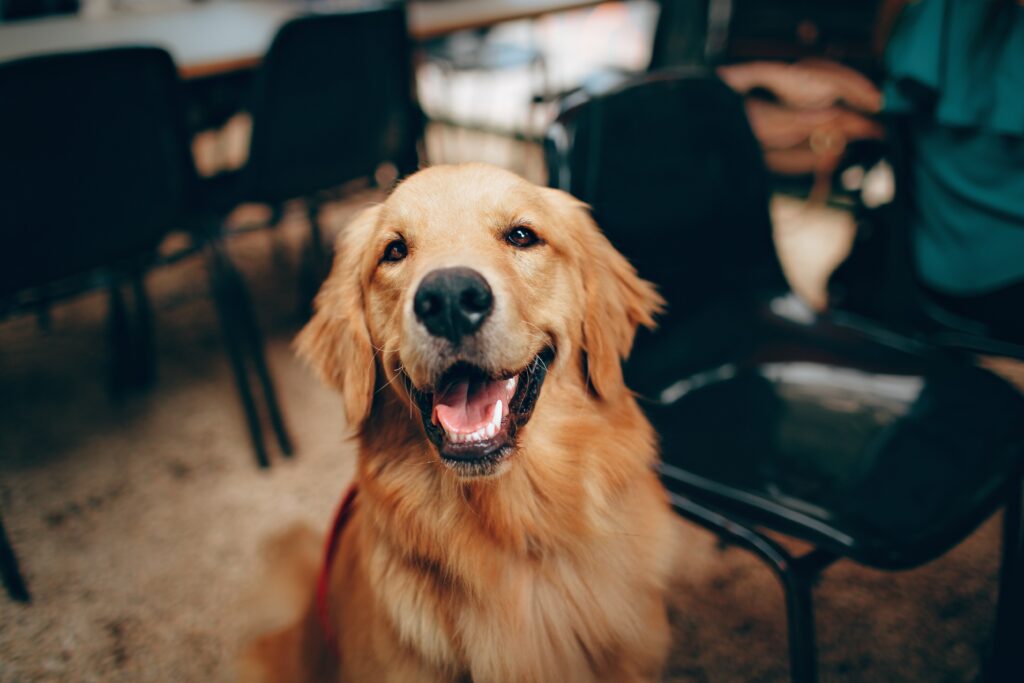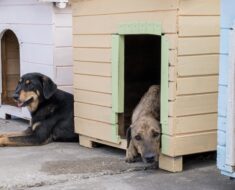Imagine coming home to find your faithful canine companion comfortably sprawled out on your bed, even though you know you left them in the living room when you headed out.
It’s a common scenario for many dog owners, and it often leaves us with a baffling question: Why does my dog get on the bed when I’m not home?
In this blog post, we’ll delve into this intriguing behavior, uncovering the reasons behind it and offering some insights into your furry friend’s world.

So, if you’ve ever wondered what’s behind your pup’s secret adventures on your bed, keep reading to uncover the fascinating answers.
Here how to clean dog bed without a removable cover?
Do You Really Need to Learn How to Keep Your Dog Off the Bed?
Whether or not you need to learn how to keep your dog off the bed depends on your personal preferences and circumstances.
While some pet owners enjoy sharing their bed with their furry companions for comfort and companionship, there are valid reasons to consider training your dog to stay off the bed.
These include allergies, hygiene concerns, or a need for personal space during sleep. Additionally, larger or more active dogs may disrupt your rest.
Ultimately, the decision should be based on what makes you and your pet comfortable.
Training can help establish boundaries, but it’s essential to balance this with affection and bonding time elsewhere.
Why Your Dog Gets on Your Bed When You’re Not Home
1. Protection
Dogs often seek refuge on their owner’s bed when they’re not home as it provides a vantage point to guard the home.
Your scent provides comfort, and they instinctively protect their territory from perceived threats or disturbances, making the bed a natural choice.
Here two story dog bed?
2. Dominance
Dogs may climb onto their owner’s bed in their absence as a display of dominance.
It can be an attempt to claim a higher position within the household hierarchy. By occupying your space, they assert their authority, albeit unintentionally, in your absence.
3. Comforting
Dogs often seek their owner’s scent for comfort and security when left alone.
Your bed carries your familiar scent, which provides reassurance during your absence. It helps alleviate separation anxiety and offers them a sense of solace until you return home.
4. Scent
Your dog’s keen sense of smell draws them to your bed when you’re away. They find comfort in your scent, which lingers on the bedding and pillows.
This connection to your smell offers them a sense of closeness and security in your absence.
5. Separation Anxiety
Dogs with separation anxiety may get on your bed when you’re not home to cope with distress. The bed carries your scent and offers a soothing environment.

Being close to your scent helps alleviate their anxiety and provides a temporary sense of companionship until your return.
6. Curiosity
Dogs are naturally inquisitive creatures. When left alone, they might explore and climb onto the bed out of sheer curiosity.
Your bed is an intriguing space with different textures and scents, making it an attractive spot to investigate in your absence.
7. Heat
Dogs may seek the comfort of your bed when you’re not home, especially during colder seasons.
Your bedding retains warmth, offering them a cozy spot to rest. It helps them stay comfortable and maintain their body temperature in your absence.
Here why does my female dog bed peeing on my bed?
8. Boredom
Dogs may hop on your bed when left alone due to boredom. Your bed’s softness and familiarity can serve as a source of amusement and diversion when there’s nothing else to do.
It offers a change of scenery and texture, helping pass the time in a solitary environment.
9. Habit
Dogs are creatures of habit and routine. If they’ve been allowed on the bed in the past, it can become a habitual behavior even when you’re not home.
They associate your absence with this familiar spot, making it a go-to place for comfort and relaxation.
What to do about your dog jumping on your bed when you leave
Train it to lay down elsewhere
To prevent your dog from jumping on your bed when you leave, train them to lay down elsewhere. Start by teaching a “down” or “stay” command and reward them when they obey.
Create a comfortable spot for them with their own bed or blanket. Make this area enticing by adding their favorite toys or treats. Consistency is key; reinforce the behavior every time you leave.

Over time, your dog will associate this designated spot with positive experiences, reducing the urge to jump on your bed.
Here why does my dog bring his toys to my bed?
Avoid encouraging the behavior
To curb your dog’s habit of jumping on your bed when you leave, avoid inadvertently encouraging the behavior. Refrain from calling them onto the bed or petting them when they do.
Instead, provide praise and rewards when they remain off the bed. Also, ensure the bed is less appealing by removing any tempting objects or scents.
Consistency in ignoring the behavior and reinforcing positive alternatives will discourage them from leaping onto the bed when you’re not home.
Reduce reasons why it might be anxious
To address your dog’s tendency to jump on your bed when you leave, focus on minimizing the underlying anxiety.
Make departures and arrivals low-key, so as not to heighten their anxiety. Provide mental stimulation and physical exercise through toys or walks before leaving.

Consider crate training for added security. Gradually increase the time you’re away to desensitize them.
If severe, consult a professional trainer or veterinarian for guidance on anxiety management techniques or medications. Reducing the sources of their anxiety can help reduce the need to seek comfort on your bed.
FAQs
How do I stop my dog from getting on my bed when I’m not home?
To prevent your dog from getting on your bed when you’re not home, use training techniques like crate training or teaching the “off” command.
Block access to your bedroom with a gate or closed door.
Provide a comfortable alternative bed for your dog. Consistency and positive reinforcement are key for success.
Why is my dog getting on my bed?
Your dog may get on your bed for various reasons, such as seeking comfort, warmth, or your scent. It might also be a learned behavior if you’ve allowed it before.
Dogs enjoy being close to their owners. To deter this behavior, provide alternative comfortable spots and enforce consistent training boundaries.
What does your dog do when your not home?
When you’re not home, your dog may engage in various activities like sleeping, chewing toys, exploring, or looking out the window.
Some dogs may experience separation anxiety and exhibit behaviors like barking, pacing, or digging.
Providing toys, a comfortable space, and gradual training can help alleviate anxiety and boredom.
How do I stop my dog from jumping on the couch when I’m not home?
To prevent your dog from jumping on the couch when you’re not home, use training methods like teaching the “off” command.
Use pet-friendly deterrents on the couch, like aluminum foil or a pet-friendly mat.
Provide a comfortable alternative spot for your dog, and ensure consistency in reinforcing the desired behavior.
Is It Normal For My Dog To Prefer My Bed Over Their Own?
Yes, it’s normal for some dogs to prefer your bed over their own due to the comfort, warmth, and your scent. Dogs seek closeness to their owners.
To encourage them to use their own bed, make it comfortable, use positive reinforcement, and be consistent with training and boundaries.
Can Jumping On The Bed Cause Any Health Issues For My Dog?
Jumping on the bed occasionally is unlikely to cause health issues for most dogs.
However, for small or older dogs, repeated jumping can strain their joints, potentially leading to orthopedic problems.
It’s essential to monitor your dog’s physical condition and consult a vet if you notice any issues or discomfort.
How To Keep A Dog Off The Bed When You’re Not Home
To keep a dog off the bed when you’re not home, use training methods like teaching the “off” command and reinforce it consistently.
Block access to the bedroom with a gate or closed door, or use pet-friendly deterrents like mats or aluminum foil on the bed. Provide a comfortable alternative bed.
What else happened when it first started doing it?
When your dog first started jumping on the bed, it likely found the space comfortable, warm, and smelled like you, which attracted it.
Additionally, it might have realized that it could access the bed without any consequences, reinforcing the behavior.
Consistent training and positive reinforcement can help change this habit.
What is different when your dog jumps on your bed?
When your dog jumps on your bed, it might exhibit different behaviors compared to other places. It may become more relaxed, exhibit playful behavior, or simply seek comfort and warmth.
Your scent on the bed can also provide a sense of security and familiarity, making it a preferred spot for your dog.
Conclusion:
In conclusion, the behavior of a dog getting on the bed when no one is home can be influenced by various factors, including separation anxiety or seeking comfort.
Addressing this behavior requires understanding the dog’s needs, providing proper training, and creating a comfortable environment to ensure both the pet and owner coexist harmoniously.






